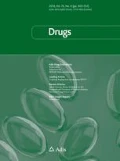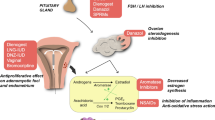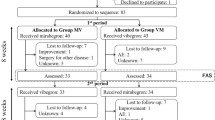Abstract
α1-Adrenoceptor antagonists such as alfuzosin, doxazosin, tamsulosin and terazosin are first-line agents for the treatment of lower urinary tract symptoms suggestive of benign prostatic hyperplasia (BPH), but are only second-line agents (doxazosin and terazosin only) for the treatment of arterial hypertension. Sexual function is complex and includes multiple domains such as sexual desire (libido), erectile function and ejaculatory function. Erectile and ejaculatory functions are frequently reduced in patients with BPH and can impact on their quality of life. Therefore, the treatment of BPH should aim to maintain or even restore sexual function.
α1-Adrenoceptor antagonists lack major effects on sexual desire in placebo-controlled studies. Reports on erectile function are inconsistent, with both beneficial and adverse effects being reported, but impotence can occur in some patients without clear differences between drugs. Ejaculatory dysfunction during treatment may represent (relative) anejaculation. It occurs more frequently with tamsulosin than with other drugs of this class, but the differences are not big enough to be consistently detectable in directly comparative studies. We propose that such differences between drugs should be weighed against differences in cardiovascular tolerability when choosing the optimal treatment for each patient.





Similar content being viewed by others
References
Major cardiovascular events in hypertensive patients randomized to doxazosin vs chlorthalidone: the Antihypertensive and Lipid-Lowering treatment to prevent Heart Attack Trial (AL-LHAT). ALLHAT Collaborative Research Group. JAMA 2000; 283: 1967–75
Chobanian AV, Bakris GL, Black HR, et al. The Seventh Report of the Joint National Committee on Prevention, Detection, Evaluation, and Treatment of High Blood Pressure: the JNC 7 report. JAMA 2003; 289: 2560–72
Rosen RC, Altwein J, Boyle P, et al. Lower urinary tract symptoms and male sexual dysfunction: the Multinational Survey of the Aging Male (MSAM-7). Eur Urol 2003; 44: 637–49
van Dijk M, Skrekas T, de la Rosette JJ. The association between lower urinary tract symptoms and sexual dysfunction: fact or fiction? Curr Opin Urol 2005; 15: 39–44
Braun MH, Sommer F, Haupt G, et al. Lower urinary tract symptoms and erectile dysfunction: co-morbidity or typical “aging male” symptoms? Results of the “Cologne Male Survey”. Eur Urol 2003; 44: 588–94
Johannes CB, Araujo AB, Feldman HA, et al. Incidence of erectile dysfunction in men 40 to 69 years old: longitudinal results from the Massachusetts male aging study. J Urol 2000; 163: 460–3
Arai Y, Aoki Y, Okubo K, et al. Impact of interventional therapy for benign prostatic hyperplasia on quality of life and sexual function: a prospective study. J Urol 2000; 164: 1206–11
Schou J, Holm NR, Meyhoff HH. Sexual function in patients with symptomatic benign prostatic hyperplasia. Scand J Urol Nephrol Suppl 1996; 179: 119–22
Frankel SJ, Donovan JL, Peters TI, et al. Sexual dysfunction in men with lower urinary tract symptoms. J Clin Epidemiol 1998; 51: 677–85
Hull EM, Lorrain DS, Du J, et al. Hormone-neurotransmitter interactions in the control of sexual behavior. Behav Brain Res 1999; 105: 105–16
Van Kerrebroeck PE, Jardin A, Laval KU, et al. Efficacy and safety of a new prolonged release formulation of alfuzosin 10mg once daily versus alfuzosin 2.5mg thrice daily and placebo in patients with symptomatic benign prostatic hyperplasia. ALFORTI Study Group. Eur Urol 2000; 37: 306–13
Debruyne FM, Jardin A, Colloi D, et al. Sustained-release alfuzosin, finasteride and the combination of both in the treatment of benign prostatic hyperplasia. European ALFIN Study Group. Eur Urol 1998; 34: 169–75
Kirby RS, Roehrborn C, Boyle P, et al. Efficacy and tolerability of doxazosin and finasteride, alone or in combination, in treatment of symptomatic benign prostatic hyperplasia: the Pospective European Doxazosin and Combination Therapy (PREDICT) trial. Urology 2003; 61: 119–26
McConnell JD, Roehrborn CG, Bautista OM, et al. The long-term effect of doxazosin, finasteride, and combination therapy on the clinical progression of benign prostatic hyperplasia. N Engl J Med 2003; 349: 2387–98
Abrams P, Schulman CC, Vaage S. Tamsulosin, a selective alpha 1c-adrenoceptor antagonist: a randomized, controlled trial in patients with benign prostatic ‘obstruction’ (symptomatic BPH). The European Tamsulosin Study Group. Br J Urol 1995; 76: 325–36
Höfner K, Claes H, De Reijke TM, et al. Tamsulosin 0.4mg once daily: effect on sexual function in patients with lower urinary tract symptoms suggestive of benign prostatic obstruction. Eur Urol 1999; 36: 335–41
Debruyne FM, Koch G, Boyle P, et al. Comparison of a phytotherapeutic agent (Permixon) with an alpha-blocker (Tamsulosin) in the treatment of benign prostatic hyperplasia: a 1-year randomized international study. Eur Urol 2002; 41: 497–506
Chapple CR, Wyndaele JJ, Nordling J, et al. Tamsulosin, the first prostate-selective alpha 1A-adrenoceptor antagonist: a meta-analysis of two randomized, placebo-controlled, multicentre studies in patients with benign prostatic obstruction (symptomatic BPH). European Tamsulosin Study Group. Eur Urol 1996; 29: 155–67
Buzelin JM, Fonteyne E, Kontturi M, et al. Comparison of tamsulosin with alfuzosin in the treatment of patients with lower urinary tract symptoms suggestive of bladder outlet obstruction (symptomatic benign prostatic hyperplasia). The European Tamsulosin Study Group. Br J Urol 1997; 80: 597–605
Schulman CC, Lock TM, Buzelin JM, et al. Long-term use of tamsulosin to treat lower urinary tract symptoms/benign prostatic hyperplasia. J Urol 2001; 166: 1358–63
Lepor H. Phase III multicenter placebo-controlled study of tamsulosin in benign prostatic hyperplasia. Tamsulosin Investigator Group. Urology 1998; 51: 892–900
Narayan P, Tewari A. A second phase III multicenter placebo controlled study of 2 dosages of modified release tamsulosin in patients with symptoms of benign prostatic hyperplasia. United States 93–01 Study Group. J Urol 1998; 160: 1701–6
Narayan P, Lepor H. Long-term, open-label, phase III multicenter study of tamsulosin in benign prostatic hyperplasia. Urology 2001; 57: 466–70
Lepor H, Williford WO, Barry MJ, et al. The efficacy of terazosin, finasteride, or both in benign prostatic hyperplasia. Veterans Affairs Cooperative Studies Benign Prostatic Hyperplasia Study Group. N Engl J Med 1996; 335: 533–9
Uroxatral (alfuzosin HCL extended-release tablets) [online]. Available from URL: http://www.fdagov/cder/foi/label/2003/21287_uroxatral_lbl pdf [Accessed 2005 Jun 30]
Cardura (doxazosin mesylate) package insert. Available from URL: http://www.fda.gov/cder/foi/label/2002/19668slr0151bl pdf [Accessed 2005 Jun 30]
Flomax (tamsulosin hydrochloride) package insert [online]. Available from URL: http://www.bidocs.com/renetnt:/Prescribing+Information/PIs/Flomax+Caps/Flomaxpdf2005 [Accessed 2005 Jun 30]
Hytrin (terazosin hydrochloride) [online]. Available from URL: http://www.fda.gov/cder/foi/label/2002/19057slr0151blpdf [Accessed 2005 Jun 30]
Andersson KE. Pharmacology of penile erection. Pharmacol Rev 2001; 53: 417–50
Goepel M, Krege S, Price DT, et al. Characterization of α-adrenoceptor subtypes in the corpus cavernosum of patients undergoing sex change surgery. J Urol 1999; 162: 1793–9
Traish AM, Gupta S, Toselli P, et al. Identification of alpha 1-adrenergic receptor subtypes in human corpus cavernosum tissue and in cultured trabecular smooth muscle cells. Receptor 1995; 5: 145–57
Dausse JP, Leriche A, Yablonsky F. Patterns of messenger RNA expression for alphal-adrenoceptor subtypes in human corpus cavernosum. J Urol 1998; 160: 597–600
Traish AM, Netsuwan N, Daley J, et al. A heterogeneous population of alpha 1 adrenergic receptors mediates contraction of human corpus cavernosum smooth muscle to norepinephrine. J Urol 1995; 153: 222–7
Krege S, Goepel M, Sperling H, et al. Affinity of trazodone for human penile α1-and α2-adrenoceptors. BJU Int 2000; 85: 959–61
Sperling H, Lorenz A, Krege S, et al. An extract from the bark of Aspidosperma quebracho bianco binds to human penile alpha-adrenoceptors. J Urol 2002; 168: 160–3
Rees RW, Ralph DJ, Royle M, et al. Y-27632, an inhibitor of Rho-kinase, antagonizes noradrenergic contractions in the rabbit and human penile corpus cavernosum. Br J Pharmacol 2001; 133: 455–8
Becker AJ, Stief CG, Machtens S, et al. Oral phentolamine as treatment for erectile dysfunction. J Urol 1998; 159: 1214–6
Kaplan SA, Reis RB, Kohn IJ, et al. Combination therapy using oral alpha-blockers and intracavernosal injection in men with erectile dysfunction. Urology 1998; 52: 739–43
De Rose AF, Giglio M, Traverso P, et al. Combined oral therapy with sildenafil and doxazosin for the treatment of non-organic erectile dysfunction refractory to sildenafil monotherapy. Int J Impot Res 2002; 14: 50–3
Choppin A, Blue DR, Hegde SS, et al. Evaluation of oral ro70-0004/003, an alpha1A-adrenoceptor antagonist, in the treatment of male erectile dysfunction. Int J Impot Res 2001; 13: 157–61
Chang AY, Huang CM, Chan JY, et al. Involvement of noradrenergic innervation from locus coeruleus to hippocampal formation in negative feedback regulation of penile erection in the rat. Hippocampus 2001; 11: 783–92
Chang AY, Chan JY, Chan SH. Hippocampal noradrenergic neurotransmission in concurrent EEG desynchronization and inhibition of penile erection induced by cocaine in the rat. Br J Pharmacol 2000; 130: 1553–60
Düsing R. Sexual dysfunction in male patients with hypertension: influence of antihypertensive drugs. Drugs 2005; 65: 773–86
Jardin A, Bensadoun H, Delauche-Cavallier MC, et al. Alfuzosin for treatment of benign prostatic hypertrophy. The BPH-ALF Group. Lancet 1991; 337: 1457–61
Buzelin JM, Delauche-Cavallier MC, Roth S, et al. Clinical uroselectivity: evidence from patients treated with slow-release alfuzosin for symptomatic benign prostatic obstruction. Br J Urol 1997; 79: 898–904
Roehrborn CG. Efficacy and safety of once-daily alfuzosin in the treatment of lower urinary tract symptoms and clinical benign prostatic hyperplasia: a randomized, placebo-controlled trial. Urology 2001; 58: 953–9
Nordling J. Efficacy and safety of two doses (10 and 15mg) of alfuzosin or tamsulosin (0.4mg) once daily for treating symptomatic benign prostatic hyperplasia. BJU Int 2005; 95: 1006–12
De Reijke TM, Klarskov P. Comparative efficacy of two alpha-adrenoreceptor antagonists, doxazosin and alfuzosin, in patients with lower urinary tract symptoms from benign prostatic enlargement. BJU Int 2004; 93: 757–62
Sanchez-Chapado M, Guil M, Alfaro V, et al. Safety and efficacy of sustained-release alfuzosin on lower urinary tract symptoms suggestive of benign prostatic hyperplasia in 3,095 Spanish patients evaluated during general practice. Eur Urol 2000; 37: 421–7
van Moorselaar RJ, Hartung R, Emberton M, et al. Alfuzosin 10mg once daily improves sexual function in men with lower urinary tract symptoms and concomitant sexual dysfunction. BJU Int 2005; 95: 603–8
Fawzy A, Braun K, Lewis GP, et al. Doxazosin in the treatment of benign prostatic hyperplasia in normotensive patients: a multicenter study. J Urol 1995; 154: 105–9
MacDiarmid SA, Emery RT, Ferguson SF, et al. A randomized double-blind study assessing 4 versus 8mg doxazosin for benign prostatic hyperplasia. J Urol 1999; 162: 1629–32
Lepor H, Kaplan SA, Klimberg I, et al. Doxazosin for benign prostatic hyperplasia: long-term efficacy and safety in hypertensive and normotensive patients. The Multicenter Study Group. J Urol 1997; 157: 525–30
Rigatti P, Brausi M, Scarpa RM, et al. A comparison of the efficacy and tolerability of tamsulosin and finasteride in patients with lower urinary tract symptoms suggestive of benign prostatic hyperplasia. Prostate Cancer Prostatic Dis 2003; 6: 315–23
Michel MC, Bressel HU, Goepel M, et al. A 6-month large-scale study into the safety of tamsulosin. Br J Clin Pharmacol 2001; 51: 609–14
Lowe FC. Safety assessment of terazosin in the treatment of patients with symptomatic benign prostatic hyperplasia: a combined analysis. Urology 1994; 44: 46–51
Lepor H, Meretyk S, Knapp-Maloney G. The safety, efficacy and compliance of terazosin therapy for benign prostatic hy-perplasia. J Urol 1992; 147: 1554–7
Lepor H. Long-term efficacy and safety of terazosin in patients with benign prostatic hyperplasia. Terazosin Research Group. Urology 1995; 45: 406–13
Mersey JH. Long-term experience with terazosin for treatment of mild to moderate hypertension. Am J Med 1986; 80: 68–72
Grimm RH, Grandits GA, Prineas RJ, et al. Long-term effects on sexual function of five antihypertensive drugs and nutritional hygienic treatment in hypertensive men and women: Treatment Of Mild Hypertension Study (TOMHS). Hypertension 1997; 29: 8–14
Kirby RS, O’Leary MP, Carson C. Efficacy of extended-release doxazosin and doxazosin standard in patients with concomitant benign prostatic hyperplasia and sexual dysfunction. BJU Int 2005; 95: 103–9
Shakir S, Pearce G, Mann RD. Finasteride and tamsulosin used in benign prostatic hypertrophy: a review of the prescriptionevent monitoring data. BJU Int 2001; 87: 789–96
Narayan P, O’Leary MP, Davidai G. Early efficacy of tamsulosin versus Terazosin in the treatment of men with benign prostatic hyperplasia: a randomized open-label trial. J Appl Res 2005; 5: 237–45
Andersson KE. Mode of action of α1-adrenoreceptor antagonists in the treatment of lower urinary tract symptoms. BJU Int 2000; 85 Suppl. 2: 12–8
Brookes ST, Donovan JL, Peters TJ, et al. Sexual dysfunction in men after treatment for lower urinary tract symptoms: evidence from randomised controlled trial. BMJ 2002; 324: 1059–61
Hisasue S, Furuya R, Itoh N, et al. Ejaculatory disorder induced by alpha-adrenergic receptor blockade is not retrograde ejaculation [abstract]. J Urol 2005; 173 Suppl.: 1069
Hellstrom WJ, Smith W, Sikka SC. Effects of alpha-blockers on ejaculatory function in normal subjects [abstract]. J Urol 2005; 173 Suppl.: 874
Giuliano F, Bernabe J, Laurin M, et al. Tamsulosin impairs bulbospongiosus muscle (BS) contractions induced by central injection of 8-hydroxy-2-(di-N-propylamino)tetralin (8-OH-DPAT) in anaesthetised rats while alfuzosin does not [abstract]. J Urol 2005; 173 Suppl.: 1444
Abrams P, Amarenco G, Bakke A, et al. Tamsulosin: efficacy and safety in patients with neurogenic lower urinary tract dysfunction due to suprasacral spinal cord injury. J Urol 2003; 170: 1242–51
Leonardi A, Hieble JP, Guarneri L, et al. Pharmacological characterization of the uroselective alpha-1 antagonist Rec 15/ 2739 (SB 216469): role of the alpha-1L adrenoceptor in tissue selectivity, part I. J Pharmacol Exp Ther 1997; 281: 1272–83
Van Kerrebroeck PE, Jardin A, van CP, et al. Long-term safety and efficacy of a once-daily formulation of alfuzosin 10mg in patients with symptomatic benign prostatic hyperplasia: openlabel extension study. Eur Urol 2002; 41: 54–60
Kirby RS. A randomized, double-blind crossover study of tamsulosin and controlled-release doxazosin in patients with benign prostatic hyperplasia. BJU Int 2003; 91: 41–4
Abrams P, Speakman M, Stott M, et al. A dose-ranging study of the efficacy and safety of tamsulosin, the first prostate-selective alpha 1A-adrenoceptor antagonist, in patients with benign prostatic obstruction (symptomatic benign prostatic hyperplasia). Br J Urol 1997; 80: 587–96
Lepor H. Long-term evaluation of tamsulosin in benign prostatic hyperplasia: placebo-controlled, double-blind extension of phase III trial. Tamsulosin Investigator Group. Urology 1998; 51: 901–6
Chappie CR, Al-shukri SH, Gattegno B, et al. Tamsulosin oral controlled absorption system (OCAS) in patients with lower urinary tract symptoms suggestive of benign prostatic hyperplasia (LUTS/BPH): efficacy and tolerability in a placebo and active comparator controlled phase 3a study. Eur Urol Suppl 2005; 4: 33–44
Roehrborn CG, Oesterling JE, Auerbach S, et al. The Hytrin Community Assessment Trial study: a one-year study of terazosin versus placebo in the treatment of men with symptomatic benign prostatic hyperplasia. HYCAT Investigator Group. Urology 1996; 47: 159–68
Batista JE, Palacio A, Torrubia R, et al. Tamsulosin: effect on quality of life in 2740 patients with lower urinary tract symptoms managed in real-life practice in Spain. Arch Esp Urol 2002; 55: 97–105
Chapple CR, Baert L, Thind P, et al. Tamsulosin 0.4mg once daily: tolerability in older and younger patients with lower urinary tract symptoms suggestive of benign prostatic obstruction (symptomatic BPH). The European Tamsulosin Study Group. Eur Urol 1997; 32: 462–70
Speakman MJ, Snijder RJ, Anthonijs G, et al. Patients on tamsulosin experiencing abnormal ejaculation choose to remain longer in clinical trials and have slightly better improvement in symptom score than other patients [abstract]. J Urol 2003; 169 Suppl.: 1296
Yoshida M, Kawabe K, Homma Y. Silodosin, a new effective alphal A-adrenoceptor selective antagonist for the treatment of benign prostatic hyperplasia: results of a phase 3 randomized, placebo-controlled, double-blind study [abstract]. J Urol 2005; 173 Suppl.: 1642
Lukacs B, McCarthy C, Grange JC. Long-term quality of life in patients with benign prostatic hypertrophy: preliminary results of a cohort survey of 7,093 patients treated with an alpha-1-adrenergic blocker, alfuzosin. QOL BPH Study Group in General Practice. Eur Urol 1993; 24 Suppl. 1: 34–40
Lukacs B, Leplege A, Thibault P, et al. Prospective study of men with clinical benign prostatic hyperplasia treated with alfuzosin by general practitioners: 1-year results. Urology 1996; 48: 731–40
Lukacs B, Grange JC, Comet D, et al. Three-year prospective study of 3228 clinical BPH patients treated with alfuzosin in general practice. Prostate Cancer Prostatic Dis 1998; 1: 276–83
Lukacs B, Grange JC, Comet D. One-year follow-up of 2829 patients with moderate to severe lower urinary tract symptoms treated with alfuzosin in general practice according to IPSS and a health-related quality-of-life questionnaire. BPM Group in General Practice. Urology 2000; 55: 540–6
Chapple CR, Carter P, Christmas TJ, et al. A three month double-blind study of doxazosin as treatment for benign prostatic bladder outlet obstruction. Br J Urol 1994; 74: 50–6
Athanasopoulos A, Gyftopoulos K, Giannitsas K, et al. Combination treatment with an alpha-blocker plus an anticholinergic for bladder outlet obstruction: a prospective, randomized, controlled study. J Urol 2003; 169: 2253–6
Barnas J, Parker M, Guhring P, et al. The utility of tamsulosin in the management of orgasm-associated pain: a pilot analysis. Eur Urol 2005; 47: 361–5
Barendrecht MM, Koopmans RP, de la Rosette JJ, et al. Treatment of lower urinary tract symptoms suggestive of benign prostatic hyperplasia: the cardiovascular system. BJU Int 2005; 95 Suppl. 4: 19–28
Acknowledgements
Within the last 5 years, the authors have received research support, consultancy and/or speakers’ honoraria from the following companies marketing α-blockers: Astellas, Boehringer Ingelheim, Pfizer and Sanofi-Aventis.
Author information
Authors and Affiliations
Corresponding author
Rights and permissions
About this article
Cite this article
van Dijk, M.M., de la Rosette, J.J.M.C.H. & Michel, M.C. Effects of α1-Adrenoceptor Antagonists on Male Sexual Function. Drugs 66, 287–301 (2006). https://doi.org/10.2165/00003495-200666030-00002
Published:
Issue Date:
DOI: https://doi.org/10.2165/00003495-200666030-00002




